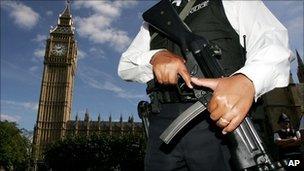Terrorism control order system ends at midnight
- Published

Control orders were introduced under the former Labour government in 2005
The control order regime restricting the freedoms of terrorism suspects is being abolished from midnight.
It will be replaced by a new regime, known as T-Pims, which has fewer controls but greater surveillance.
Under the changes, suspects moved to different parts of the UK to break up alleged networks have returned to their home areas in London.
The seven-year-old control order regime monitored suspects but was criticised by civil liberties campaigners.
Judgements released by the High Court revealed some details of alleged extremist activity by suspects - but critics said the controls could not be properly challenged because the individuals did not see all of the secret material used against them.
The government pledged to replace control orders last year after a long behind-the-scenes battle in the coalition.
Under the new Terrorism Prevention and Investigation Measures, external, which are replacing control orders, suspects cannot be relocated to other cities but still face other restrictions, such as an order to stay in overnight and bans on who they can meet.
Unlike control orders, they will have greater use of phones and computers. Suspects can only be subjected to an order for two years, unless the home secretary proves to a court that there is material that would justify further controls.
A 42-day transition period between the systems was part of a plan to ensure that the police and Security Service MI5 had sufficient resources to watch the suspects now that they would have greater freedoms.
Relocation orders
As of December, there were nine men on control orders around the country. Two men have recently had their restrictions lifted.
Four men were known to be under relocation orders to other cities and towns.
At least two of them are already back in London. The men, both married with children, have not been allowed back to their family homes, but placed in nearby accommodation which was chosen by the authorities.
Speaking on Tuesday, Assistant Commissioner Cressida Dick of the Metropolitan Police told MPs that the new system could lead to more prosecutions.
"Potentially, operationally, there could be some opportunities provided by the fact that there is some sort of loosening, in some senses, of the restrictions on individuals," she said.
"That could provide us - and we don't know, it's too early to say - with some investigative opportunities. We want to bring people to justice wherever we can."
Ms Dick said the police were confident they could manage any risks posed by the new regime.
- Published1 September 2011
- Published26 January 2011
- Published26 January 2011
- Published26 January 2011